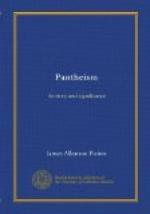Notwithstanding the admiration, and even reverence, with, which Spinoza was regarded by a few scholars during his life-time, it cannot be said that during the century following his death, in 1677, there was any wide acceptance of his ideas. The times were not favourable. For the political and social power of ecclesiasticism, whether established, or unestablished, compelled men of science and philosophers to treat dominant creeds as consecrated ground, on which ordinary methods of research, reasoning or criticism could not be pursued. In saying this, I am far from accusing those illustrious men of insincerity. Some few of them, indeed, used a sort of cryptic satire to excuse to themselves an unwilling conformity. But, for the most part, the moral pressure of tradition and education compelled enlightened men to identify the doctrines of a personal God, Creation, Fall, Redemption and Immortality with moral interests vitally essential to human welfare. Under such circumstances a prudent conservatism was inevitable.
[Sidenote: Gradual Spread of Spinoza’s Influence.]
[Sidenote: Fichte.]
[Sidenote: Hegel.]
Yet, notwithstanding these restraining influences, the thoughts breathed forth by the lonely thinker were as living seed wafted abroad, and falling here and there on good ground, germinated and brought forth fruit. Sometimes his influence was acknowledged, sometimes it was repudiated; but it was there, nevertheless. It is doubtful whether Fichte’s idealism could have taken the form it did had not Spinoza preceded him. Hegel, setting out on his great intellectual career with a resolve to defend the faith once delivered to the saints, yet traces its roots to a philosophy of Being which, at any rate, looks very like Pantheism. This is perhaps delicate ground to tread. For if one is asked whether one understands Hegel, one is tempted to answer, like the pious Scotch lady when her friends enquired whether she had understood the minister’s sermon, “Hech, sirs, d’ye think I’d presume?” Still, not my own reading of him only, but Mr. Haldane’s profoundly interesting interpretations given in his Gifford Lectures, make the impression that Hegel’s eternal process is always a projection of subject as object and re-integration of the two. And this goes on, not only on the infinite, but on the finite scale, amidst the infinite number of processes which constitute the Whole of Being. But this seems to leave no room for creation out of nothing, and it is to that extent pantheistic. There are doubtless saving interpretations, but it is difficult to follow them; and they cannot cancel the initial postulate of one eternal process, consisting in the relations of infinite subject, object and reunion. On such a system I do not see how there can be anything but God, and, therefore, notwithstanding his aversion to the name, count Hegel a Pantheist.
[Sidenote: Goethe and Wordsworth.]




